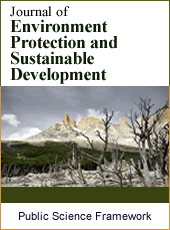Journal of Environment Protection and Sustainable Development
Articles Information
Journal of Environment Protection and Sustainable Development, Vol.5, No.3, Sep. 2019, Pub. Date: Sep. 6, 2019
Management and Sanitation Measures on Solid Household Waste: A Threat to Gbadolite Municipality, Nord-Ubangi, DRC
Pages: 88-95 Views: 2059 Downloads: 398
[01]
Koto-te-Nyiwa Ngbolua, Department of Biology, University of Kinshasa, Kinshasa City, Democratic Republic of the Congo; Ubangi-BioXplore Project Biodiversity Exploration of Oubangi Ecoregion and Carbon Inventory, University of Gbado-Lite, Gbado-Lite City, Democratic Republic of the Congo.
[02]
Amédée Kundana Gbatea, Ubangi-BioXplore Project Biodiversity Exploration of Oubangi Ecoregion and Carbon Inventory, University of Gbado-Lite, Gbado-Lite City, Democratic Republic of the Congo; Department of Environmental Sciences, University of Gbado-Lite, Gbado-Lite, Democratic Republic of the Congo.
[03]
André Nzamonga Gamo, Department of Environmental Sciences, University of Nord-Equateur, Gbado-Lite, Democratic Republic of the Congo.
[04]
Ruphin Djoza Djolu, Department of Environmental Sciences, University of Gbado-Lite, Gbado-Lite, Democratic Republic of the Congo.
[05]
Colette Ashande Masengo, Department of Environmental Sciences, University of Gbado-Lite, Gbado-Lite, Democratic Republic of the Congo.
[06]
Gédéon Ngiala Bongo, Department of Biology, University of Kinshasa, Kinshasa City, Democratic Republic of the Congo.
Man is the main virus of its environment and, since the 70-planet earth is facing the problem of pollution by waste from human activities. The collection of household waste is one of the most difficult issue faced by urban authorities in of developing countries. The main aim of this research was to identify the solid waste management system and analyze some of these shortcomings then propose a sustainable solution for the environment. A survey was carried out among 400 households in Gbadolite municipality, across its five districts. The structured interview was used as method by administrating questionnaires to the respondents. The findings show that 78% of households have garbage cans that are garbage wells, but these garbage are not sorted out while 100% of households mix their garbage (organic and non-biodegradable). The majority of households either dump in illegal landfills (which can be found be everywhere in the city), incinerate or dump in inappropriate locations their wastes. This is due to the lack of space in their vicinity that is why these wastes are deposited in public places. The management of household waste as practised in Gbadolite municipality is of the "classic type", not contributing to the sustainable development of the environment. The sanitation situation remains worrying in this area and the environment is polluted. This situation puts the health and well-being of populations at risk on a daily basis. The management of solid household waste in Gbadolite municipality requires effective and sustainable solutions, from which it is essential to put in place strategies for a good management in this area.
Management, Measures, Household Waste, Sanitation, Gbadolite
[01]
OMS, 2007: Quatrième conférence ministérielle sur l’Environnement et la Santé, habitat et Santé, Etat connaissance, Hongrie, Budapest.
[02]
Mbadiko CM, Bongo GN, Lompo E, Bomoi M, Kemfine LL and Mindele LK (2018). Characterization of the waste produced in the Mbanza-Lemba market, city of Kinshasa in the Democratic Republic of the Congo. International Journal of Environmental Planning and Management, 4 (3): 50-57.
[03]
Luwesi CN, Katsiatsia JK and Mikumba CK (2019). The issue of solid household waste management in the Muteba health area (Ngaba), Kinshasa, DRC. Journal of Scientific and Technical Research, 18 (2): 13485-13491.
[04]
Diabagate, 2007: Assainissement et gestion des ordures ménagères à Abobo, cas d’Abobo-Badule, Mémoire de Master, Institut de Géographie Tropicale/Université d’Abidjan, 96p.
[05]
Buba HB (2016). Assessment of household solid waste management in Gombe, Nigeria. Unpublished MSc dissertation, Department of Urban and Regional Planning, Faculty of Environmental Design, Ahmadu Bello University, Zaria, Nigeria, 91 pp.
[06]
Leakey R and Lewin R (1996). The Sixth Extinction: Biodiversity and its survival. A Phoenix paperback Science Masters Series, Phoenix, USA, 271 pp.
[07]
Yoada RM, Chirawurah D and Adongo PB (2014). Domestic waste disposal practice and perceptions of private sector waste management in urban Africa. BMC Public Health, 14: 1-10. doi: 10.1186/1471-2458-14-697.
[08]
Singh J. (2016). Modern waste management and environmental protection. International Journal of Chemical Studies, 4 (2): 101-106.
[09]
Ferronato N. and Torretta V. (2019). Waste management in developing countries: a Review of global issues. International Journal of Environmental Research and Public Health, 16 (6): 1-28.
[10]
Ngbolua KN, Mafoto A, Molongo M, Magbukudua JP, Ngemale GM, Masengo CA, Patrick K, Yabuda H, Zama J, Veke F (2011). Evidence of new geographic localization of Okapia johnstoni (Giraffidae) in Democratic Republic of the Congo: The rainforest of “Nord Ubangi” district. Journal of Advanced Botany & Zoology. V2I1. DOI: 10.15297/JABZ.V2I1.02, 2014.
[11]
Ngbolua KN, Mafoto A, Molongo M, Ngemale GM, Masengo CA, Gbolo ZB, Mpiana PT, Bongo GN (2015). Contribution to the Inventory of "Protected Animals" Sold As Bush Meats in Some Markets of Nord Ubangi Province, Democratic Republic Of The Congo. Journal of Advanced Botany and Zoology, V3I2. DOI: 10.15297/JABZ.V3I2.02, 2015.
[12]
Mbadiko CM, Bongo GN, Mbunzu HM, Kemfine LL, Bomoi M and Mindele LK (2018). Characterization of household waste produced in the 17th May district, Kimbaseke municipality in Kinshasa city, the Democratic Republic of the Congo. International Journal of Life Science and Engineering, 4 (3): 50-57.

ISSN Print: 2381-7739
ISSN Online: 2381-7747
Current Issue:
Vol. 7, Issue 3, September Submit a Manuscript Join Editorial Board Join Reviewer Team
ISSN Online: 2381-7747
Current Issue:
Vol. 7, Issue 3, September Submit a Manuscript Join Editorial Board Join Reviewer Team
| About This Journal |
| All Issues |
| Open Access |
| Indexing |
| Payment Information |
| Author Guidelines |
| Review Process |
| Publication Ethics |
| Editorial Board |
| Peer Reviewers |


